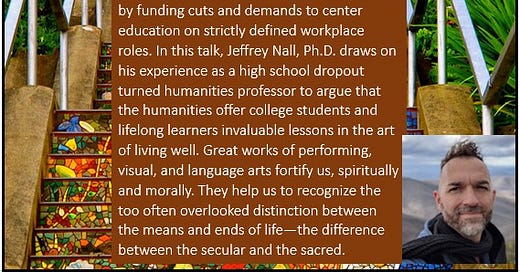Event: "Getting Our Priorities Straight: Humanities and the Art of Living" (Sunday, May 1, 2022)
Sunday, May 1, 2022 at the Nature Coast Unitarian Universalists, Citrus Springs, Florida
On Sunday, May 1st I will present my talk “Getting Our Priorities Straight: Humanities and the Art of Living” at the Nature Coast Unitarian Universalist fellowship, in Citrus Springs, Florida. The program begins at 10:30am and is open to the public.
The Topic
The humanities continue to be undermined by funding cuts and demands to center education on strictly defined workplace roles. In this talk, I draw on my experience as a high school dropout turned humanities professor to argue that the humanities offer college students and lifelong learners invaluable lessons in the art of living well. Great works of performing, visual, and language arts fortify us, spiritually and morally. They help us to recognize the too often overlooked distinction between the means and ends of life—the difference between the secular and the sacred. The fact that the humanities continue to be diminished as frivolous is itself evidence of a lack of genuine appreciation for this elemental distinction.
Excerpt
The following is an excerpt of the remarks I will deliver for the May 1st 2022 program for the Nature Coast Unitarian Universalists.
Since June 2010 I’ve been teaching college courses in the humanities. Over the years I’ve learned that most people don’t really know what the humanities are before entering a humanities’ college classroom. I’ve also learned that this lack of knowledge doesn’t stop most people from concluding that the humanities are a complete waste of time. This is something I can relate to as I recall being a community college student begrudgingly taking a humanities survey course and an ethics course, frustrated that I was being sidetracked from my preferred course of study in film. (That’s right, at the time I failed to connect the dots of the humanities and ethics to film.)
One of the chief lessons the humanities teach those students who stick it out for the semester is the folly of judging something before you understand it. The humanities is a field of study that, in a very Jesus-like fashion, loves everyone including those who are, at the onset, its enemies, or at least rather hostile the field of study. The wisdom of loving our enemies is revealed when we discover that much of what our enemies hate about us is based on prejudice and ignorance.
My experience shows again and again that those who learn what the humanities are and what they enable us to understand are quickly converted from passive enemies to vocal supporters. This includes many majoring in health science, biological science, technology, and mathematics. I’ve had more than a few engineering students remark that their experience with humanities was, well, humanizing; that it allowed them to think in a more reflective manner and facilitated contemplation of direct and fundamental matters of concern: their personal development, their relationships, their values, their purpose. Just last week a student graduating from one of the colleges where I teach sent me a note about her experience during Spring 2021. She gave me permission to share her letter. Here’s part of what she wrote:
“I was in one of your evening virtual humanities classes last Spring and I always looked forward to class every week. The lectures and discussions we had in class often became dinner topics. It expanded my views and helped me to consider all angles of a subject and to question things. I think the world would be a better place if everyone were to take a class like this, then maybe we would all understand each other a little better. The thought of a world where people can disagree and have a spirited debate without having to win or resort to pettiness is the world I wish for future generations. That is why humanities are so important and you made it interesting and enjoyable to learn….You created a safe space for everyone to speak their mind, even if many in my class chose not to speak at all.”
The humanities, at their best, invite us to contemplate the human condition from an array of perspectives, including those that we identify with, those that challenge us, and some that repulse us. The humanities remind us, again and again, that being discomforted or unfamiliar with an idea, belief, or expression is not evidence that it is wrong; neither is it evidence it is right.
The humanities give us a seat at the table of cultural creation. We learn to critically examine beliefs, institutions, and cultural practices. Where did they come from? How were they formed? What do they teach us about ourselves? Do they enable us to flourish, or do they denigrate our humanity?
The humanities force us into the blinding light of cultural difference, like the captives in Plato’s “Allegory of the Cave,” to lay claim to our intellectual autonomy and creative responsibility as culture creators as well as culture consumers.
Speaking Services
Dr. Nall delivers energetic live presentations and engaging workshops on the subjects featured in Humanities in Revolt. Those interested in booking a workshop or talk can get in touch through Facebook or by leaving a comment.
Subscribe
Subscribers will receive periodic posts pertaining to the broad domain of humanistic inquiry, from the insights of great thinkers throughout human history, the meaning and importance of critical thinking and ethics, the underappreciated poetry in everyday existence, to contemporary cultural analysis and the ongoing struggle to combat human oppression and violence. You will also have the opportunity to engage the author and our online community in dialogue about each post.
Why get a paid subscription?
Paid subscriptions directly support Dr. Jeffrey Nall’s efforts to produce and share publicly accessible independent scholarship and analysis. Supporting donations can also be made through PayPal. For more about my work go to JeffreyNall.com and find me on Twitter, Facebook, and Instagram.






I agree that there’s an obvious link between film/art and ethics. It’s kinda my raison d’être with what I write about. I started writing it precisely because I noticed how few people understood the connection. Despite many people writing, producing and starring in stories about political tribalism and morally destructive behaviour, many of them fail to see when people are doing so in real life. In some cases they engage in the behaviour their characters they play were known for being the bad guy for. The humanities have a lot to teach us if they’re done right.